My horse Knight has “significant” kissing spines. I found this out on his 11th birthday.
This is why he’s had time off for the last several weeks as we tried to rule out various issues and attempt pain management treatments.
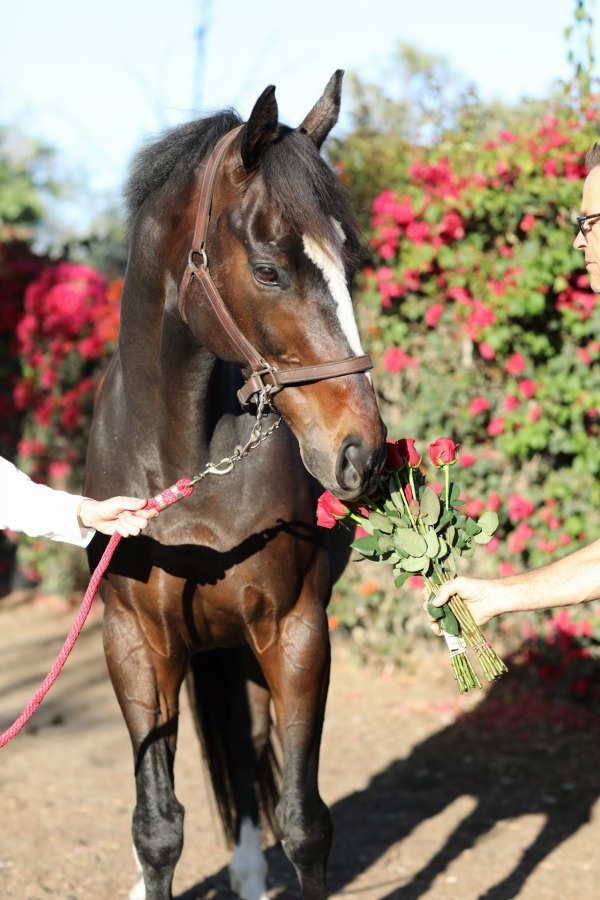
In happier news, here’s an outtake from our photoshoot with @LadyPhotographic for the cover of my upcoming horse lover’s book!
There are so many twists and turns in this story line that I’m not sure how to summarize this in one easy blog post.
Suffice it to say, I knew something was dreadfully wrong when at the end of March I carried my saddle toward Knight as he was awaiting me on the crossties and he pinned his ears and gave me the nastiest face I have ever seen him wear. When I tightened the girth he kicked out and I knew something was not okay. He has never displayed that kind of behavior while tacking up. He’s actually a fairly pleasant chap.
I did not ride that day, nor subsequent ones. The following week my vet came out (Knight’s been seeing her every week since that initial nasty face incident.) He’s had two chiropractic treatments, been on gabapentin, acupuncture and ShockWave. His “work” has become turn out, lunging and hand walking.
What the Heck is Wind Up?
Before we did the X-rays two or three weeks ago the term my vet used was “wind up.” I had never heard of that but she likened it to fibromyalgia in humans. His back muscles were so tight that when she either tried to insert or pulled out the needle (I can’t remember which one), the needle was bent.
This new-to-me fibromyalgia-ish thing called”wind up” was the first piece of information that made my heart sink. And with every week that has passed, it has sunk a little lower. The prescription for gabapentin was/is supposed to help with the nerve pain.
Now before you start feeling sorry for Knight, I have to make it clear that he looks great and is having a the time of his life playing face tag with two of his pipe corral neighbors. He’s shiny and pretty and is not feeling sorry for himself at all. His summer vacation just arrived earlier than mine.
Not a Textbook Spine
Two weeks ago, after things we tried didn’t seem to be helping address the pain, the radiographs were taken.
Tangent: if you’re going to buy a new horse, especially an OTTB, please pay for a spine X-ray. I didn’t even know that was a thing to do on a pre-purchase exam. I’m probably getting ahead of myself here in the chronology of the story, but a second opinion vet I spoke to on the phone said no studies have been done, but he has a hunch that probably 70% of Thoroughbreds that raced have some degree of kissing spines.
So, I knew things weren’t good when my vet wanted to meet with me in person along with my trainer after having taken the spine X-rays. A formal meeting sounded grave. We met two Saturdays ago and she started the conversation by flipping through pages in a textbook to show me what a horse’s spine is supposed to look like. I studied radiograph images of horses with beautiful spaces between each vertebrae. Then she pulled up Knight’s images. It didn’t take an equine science degree to see that several of his vertebrae underneath where the saddle goes are in fact “kissing.”
She showed me various sections of his spine and we talked and I paraphrased what she was telling me to make sure I understood, and I took down a full page of notes on a legal pad. It was kind of an information overload situation.
As I was trying to take it all in I had no idea if Knight should be euthanized (I didn’t think so, but the thought crossed my mind), turned out into a big field somewhere for the rest of his life, or if there was hope he could still be ridden. I just remember feeling really confused. Relieved to know what was going on with his anatomy, but confused with this new, terrible information.
As I jotted down about five various types of things that could be done for Knight ranging from injections to surgery, I felt really strongly against surgery. It sounded really invasive and expensive and it’s not like Knight is a high dollar horse with a high end career to keep going.
Grieved and Confused
The day after this meeting when I saw the radiographs I cried all day. It was a Sunday and my husband was out of town. I felt really alone. I cried because of the guilt I had realizing that my poor horse had been in pain probably for a long time, and I was oblivious to it. I would never, ever want to do anything bad to my horse and here I was, riding around having a wonderful time and he was not.
Aside from being confused about all the different treatments and what I should do for Knight’s future–I was confused that he did not exhibit most of the typical red flags for kissing spines such as rearing, bucking, not maintaining a canter, shaking his head, refusing jumps. He was and has been a gentleman.
Right after my vet shared everything with me, my trainer and I both agreed that most likely Knight’s ongoing battle with ulcers is related to the kissing spines chronic pain. And the fact that he gets more tense as he works through more jumps (even though they’re small) rather than calming down, probably also had to do with pain.
Horse Friends are the Best
I reached out via phone and text message to a handful of my close horse friends who “get” this. It’s a blur now, but I’m so grateful to you ladies (you know who you are) who kept a positive spirit and asked if there was anything they could do, offer to help me research various types of other boarding and/or retirement options–should they be needed.
One of my biggest supporters I met thanks to this blog and am now friends with in real life reminded me that Knight hasn’t changed and he’s healthy and we just need to figure out what his job should be so that he can be happy and feel good.
Another friend I have known for years but we’re now in different states so not super connected, shared that her mare had kissing spines, she had the surgery for it and I should call her or text her any time. (She has rehabbed her equine BFF and they are going to their first event later this spring!)
Right now I’m doing okay. Bummed, but feeling like time is on my side to figure out what can be done. I ended the meeting with my veterinarian saying that I loved and respected her, but for my own sake and due diligence, I wanted to get other opinions. And that’s what I’m in the middle of right now.
From what it sounds like based on conversations with other horse folks, kissing spines is such a case by case thing that is different for each horse. One friend shared she knows an eventer whose horse with kissing spines competes at the 2* level. Then another barn friend said she knew someone who had to fully retire their 6 year old horse. And I have heard a bunch of other stories in between.
So the question is: what will Knight’s future be? And the answer is I don’t know.
Most of the note-taking, radiograph analyzing meeting is a blur right now, but I remember saying, “Well, I’m a horse lover first and an equestrian second. I will do right by my horse.” Now we just have to take baby steps each day and figure out what doing right by Knight means.
I have a feeling he will tell us as time moves on. After all, he did a pretty good job of telling me that day in March when I saddled him and he said, “No!”
Thank you for reading.
Leave a Comment: What has been your experience with kissing spines? Do you or someone you know have a horse that’s been affected?
If you are not on my email list for very important horse lovers, you should sign up! You’ll get the inside scoop about fun new products, interesting equestrians and giveaway announcements via twice-a month emails. To get on the list simply click here.
Are you social too? If you’re not already, trot along with my OTTB Knight and me on Instagram, Facebook, Twitter and Pinterest. See ya there!

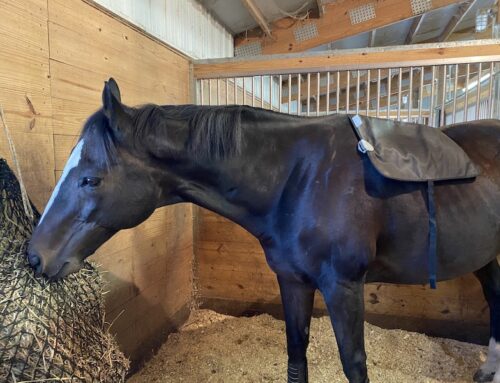
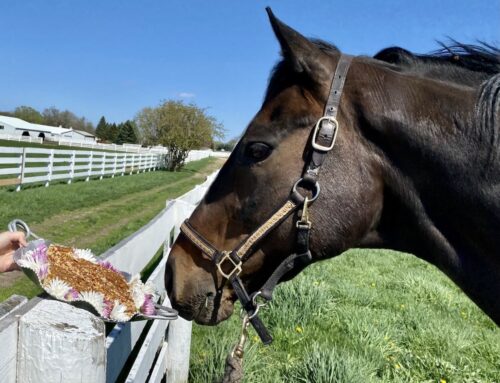
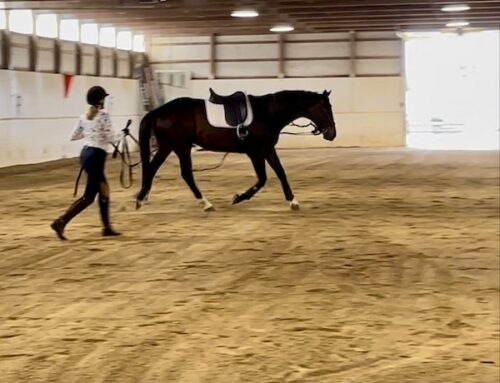
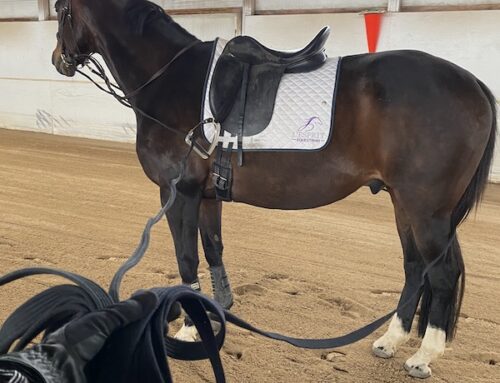
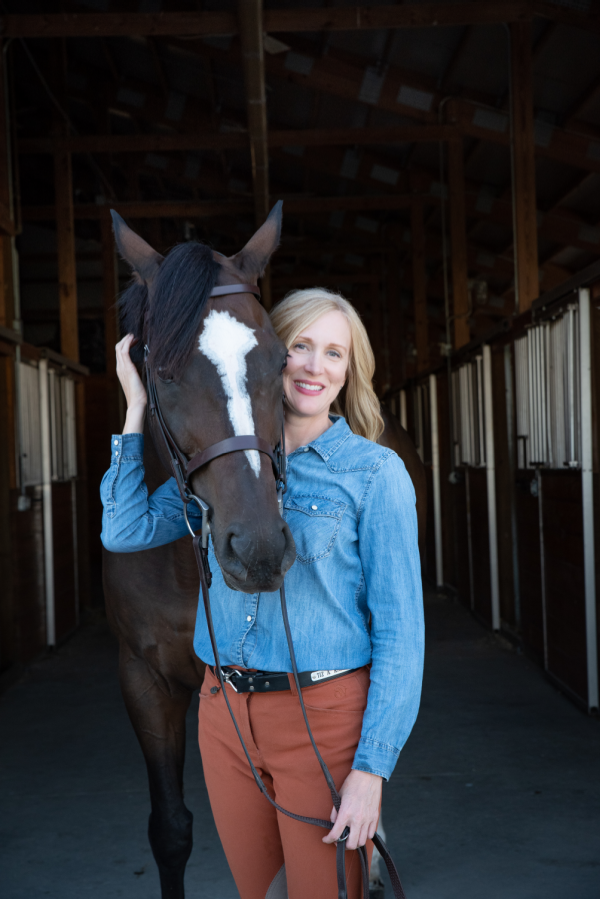

Sending love, hugs, prayers for both you and Knight. We’ve not dealt with kissing spines but understand completely about needing to find the best care for a much loved horse. Your listening to Knight and his trusting you says much about your relationship. You will find the way. Please keep me updated.
Thank you, Elaine. I really appreciate your kind words. Prayers are always welcomed. 🙂
So sorry to read this, Susan. I have no experience with kissing spines in any of our horses, but I know it’s a diagnosis no horse owner wants to hear. Take your time and figure out what Knight can do for the rest of his life.
Thank you, Martine. I always appreciate your support and input. 😉
So sorry to hear this, you and I seem to be going through something similar. My 11 yr old gelding was diagnosed with navicular a couple weeks after his birthday and I’ve been hearing retirement/euthanasia stories amid stories of full recoveries and people saying that it’s not too big of a deal. It really is a struggle to taper our expectations in these situations, so I feel for you there. Hopefully you’ll be able to find a good place with Knight with your second opinions.
Thanks, Sarah. The timing on the diagnoses! Ug! Keep me posted on what you are going to do for your boy. Navicular–what a blow. I’m so sorry to hear this.
Oh, I am sorry to read this news. 🙁 It really is a case by case basis. Just this past winter, a friend here in Maine had her horse undergo the surgery for kissing spine and he seems to be doing great as of now. It is such a tough call and very personal. There is no doubt you will do the absolute best and the right thing for Knight no matter what you choose. *hugs*
Hi Elizabeth. Thank you for taking the time to leave a comment. Do you know which type of surgery your friend’s horse had? So far, I’ve only heard really positive stories about the procedures.
Sorry I never came back to check on this. She would be happy to chat with you! Her name is Sarah and she is on Instagram as tale_of_two_horses. 🙂
I have you to thank. Sarah reached out to me and we exchanged messages via Instagram. The before and after of her boy is pretty amazing. I was totally encouraged to chat with her. Thank you for thinking to connect us. 🙂 I plan to keep bothering her as different questions pop up.
I’m so sorry to hear this! I think a second opinion is a great idea. I know their are some vets who specialize in this type of diagnosis that will review xrays for an additional cost and give you a phone consult. I think it really says a lot about how much your horse loves you that he didn’t do anything dangerous under saddle. <3 Sending hugs!
Thank you. Virtual hugs are welcome and appreciated.
KS is extremely common in warmbloods too. A lot of horses have it and people just never know. FWIW, I know a few people that have done the surgery and had excellent results.
Thanks for sharing that, Amanda. Do you know if they did the ligament snip or the one where they shave off some of the bone?
Two had the ligament, one had the bone shaving.
I am sorry to hear that Knight is affected by this and I hope you find the right solution for keeping him comfortable. I do know of one horse that has had the surgery — although it was actually not that invasive. He had like 4 tiny incisions where ligaments were snipped, and recovered very well in a matter of months. He does just fine at 3′ with his kid now and definitely has room to move up if she wants to. It definitely doesn’t have to be career-ending.
Wow! This is a uplifting story. Thank you. I reluctantly published this blog post because I feel like it’s just all horse health drama, but I’m so glad I shared. Hearing your story and all the others gives me hope.
Ugh I’m sorry to hear about this. It’s not an easy decision to try to make ever. Please keep us posted on his progress and also your decision making journey – I feel like that’s a part of horse ownership that people don’t talk about much but ends up being such a big part of it
Such a good point! Soo many decisions to make and often no clear road map. Thanks for the possible future post idea.
Are you familiar with Visconte Cocozza’s work?
https://www.viscontecocozza.com/links/
I am not familiar! Must check out. I was told to follow Art2Ride.
Yes, both are great resources for helping horses with KS without resorting to surgery or injections.
I am so sorry to hear about this! But Knight is lucky to have you as his person to find and provide the best solutions and care.
It sounds like you’ve heard plenty of others’ stories about their experiences with kissing spines, and I will add mine. Duke, the horse I lease, had kissing spines. He did need surgery, but it was a type that was minimally invasive. It really helped him, and he had a very successful year eventing last summer, and we’re planning a great season this year. We do continue to give some special care to his back – extra liniment rinses, I dismount to walk him out, etc. I know each horse is a different case, but hopefully it helps to hear of successfully treated horses! Keep us posted on your journey and how Knight is doing!
Thank you for sharing this story. I do really appreciate firsthand accounts of people who know/love horses with this condition. It is super helpful. I will keep you all posted. 🙂
Sorry to hear this. I’m sure you will make good, informed decisions for Knight. Good luck and chin up!
Oh Susan, That’s sad! I’m sorry you and Knight are dealing with this.
Thanks, Alanna. A total bummer. But I am relieved we figured it out and that we can try things to help him.
Oh man, I’m so sorry to hear this! I’ll be keeping you and Knight in my prayers. For what it’s worth, I think you’re doing righ by him and I know that whatever the future holds, you’ll make sure Knight is happy! Big hugs ❤️
Thank you, Tracy. I firmly believe in the power of prayer. I really, really appreciate your thoughts and comment too.
Sorry to read this, but I know Knight is in good and loving hands. You’ll do right by him!
Thanks, L! That means a lot to me. 🙂
I’m so sorry, that’s really too bad. I had a student’s horse years ago have kissing spines that they were able to manage with injections I think? It definitely made his behavioral problems worse though and the kid wasn’t advanced enough to handle him even on good days. I hear he’s with a new rider who is jumping him and having a great time!
Susan, I am so, so sorry to hear of Knight’s diagnosis. I can completely empathize with your grief. I had not one, but two horses diagnosed with KS. In my experience, plus those of people around me, it does really seem to be a case by case basis depending on the individual horse. I have heard fantastic success stories and I have heard retirement cases. I wish the very best for you and Knight. In my case, one horse I had the lig-snip surgery done. He healed beautifully and is now a pleasure/trail horse, limited to flatwork due to some secondary issues that came to light after his back was resolved. My second horse was not so successful and his breeder took him back as a companion animal. I do wish you all the very best and if you ever want to reach out to someone who has also been there, feel free to email me at shaunatwentytwelve at gmail dot com.
I’m so sorry. I’ve heard lots of positive stories about the ligament surgery, but no personal experience.
Thank you, Olivia. I have heard several good reports about that too. 🙂
When I was having troubles with my TB, Romey, I told my vet I thought he had kissing spine. And my vet basically said, yeah probably, most tb’s do! And he did in fact have it, but it wasn’t actually causing his issues.
I had a warmblood with it too. He was very painful, and like Knight, it was happening right where my saddle sits. It took a little while to figure out what the issue was, but once we x-rayed the back, there it was. You’re absolutely right that it affects each horse differently. But for my guy, we were able to get back in the show ring and showed in the low amateur jumpers (1.2m). He got injected once a year, and stayed on a low dose of aspirin in his feed every day. Eventually as he got older, the areas fused. He lost some mobility but was not painful. He lived a long life as a riding horse despite the kissing spine.
So hopefully you’ll find what works for Knight and what keeps him happy. My fingers crossed this is just a bump in your road together and you’ll be back riding him comfortably in now time!
Stacie, thank you, thank you! I am so encouraged by your comment. I wondered about the fusing part. Do you remember what the injections were?
It was a corticosteroid like they would get in a hock injection.
So sorry to hear this! Please, please check out art2ride! The success stories with kissing spine there are amazing! It’s truly incredible! Knight is in good hands with you, I am sure :).
I sadly have experience with kissing spines and I’m sorry you are dealing with it. Regardless of treatment choice caring for a horse with kissing spines who is being ridden takes a lot of careful and consistent care along with patience and an eagle eye for issues. Feel free to contact me to discuss my experience and opinions on various treatments, etc – I just don’t want to bog you down with information you may not want and I have a lot of thoughts, lol. I did want to say a few things though.
Please make sure you find a vet who will figure out the cause of the kissing spines. Kissing spines is a symptom and not the source of the problem. Horses either have a ligament issue where it’s too tight (hence why the ligament works in some) or they have arthritis in thoracic joints of the spine. The first few vets I dealt with were clueless on this. In Stampede’s case he has arthritis so surgery would have been useless. Careful management and care allowed him to have several years of riding but ultimately he started to have issues in other parts of his body from compensating for so long (it took several years to diagnose) as well as some tripping issues and retired last year.
There is another blogger who had a horse who she did the lig snip surgery on and it did not work but I’m totally blanking on her name. She then got a new horse who also had kissing spines and she returned him to his breeder I believe. I don’t think she’s blogging anymore. I seem to think they were both chestnuts but that’s all I can remember right now.
Lastly, I had a lot of luck with icing Stampede’s back after workouts. He always loved it. I have the Ice Horse pad – it’s just sitting around now that he’s retired so if you want to try it I would certainly sell it.
I wish you the best and like I said I can talk on and on about it if you would like to discuss! I did blog about it over the years but I’m sure I didn’t say everything.
That would be me 🙂 I posted a comment upthread, but I think it got hung up in moderation land. I am a year out from my last diagnosis on KS, and I still read everything I can on the subject, even though it no longer applies to me. I’m happy to share anything I have learned.
I’m glad you chimed in Shauna. If you are still blogging let me know where to find you. Hopefully you are having better luck with horses now.
More hugs coming at you. I am certain you will make the best call for Knight. And I am always here to chat over a burger or waffle sandwich or gelato or wine or breakfast or tacos.
Sorry Knight and you are going through this.
🙁
I’m so sorry to hear this. While not dealing with kissing spine, I can totally relate as my 10yo gelding was just diagnosed with ring bone. Like you I am am a horse lover first, equestrian second. After several vet consults and and meetings with my trainer, vet and farrier we are workout a game plan to ensure Calvin is pain free. I am sure you will do right by Knight.
So sorry, Susan, to hear of this! Sending positive healing vibes to Knight. Like another poster, I also have a horse with navicular; Dx’d when 6. I also went through the “euthanization???” thought process a year in when I couldn’t seem to keep her sound. However, I’m now 5 years in, and with a great farrier and shoeing protocol, plus Equioxx, she’s currently sound. I did take her to UCDavis 2 years ago for an MRI, and it turns out in addition to “mild” navicular changes in both front feet, she also has quite a large cyst on her RF coffin bone. Inoperable of course. So, it’s been a journey. Anyway, that aside, after reading your post, I too Googled about KS (always want to learn!). In addition to my navicular QH, I also have an OTTB mare that started occasionally “blowing up” (trainer’s term) under saddle about 3 years ago. Trainer stopped riding her b/c she couldn’t make any progress in stopping that behavior. I won’t ride her without the teensiest bit of Ace; I cannot afford to get bucked off. I’m having her chiro’d this coming week; we’ll see what the gal says. Maybe the next step will be spinal x-rays?
Anyway, (long comment, sorry) it sounds to me as if the lig-snip surgery might be the way to go, IF Knight is a candidate for it!! Wishing the two of you THE BEST!
Time and baby steps, as I am sure you know by now are your best friends. He is still your boy and y’all will figure out the right thing for him. <3 I am glad you got a second opinion and I am sure your vet would agree based on what you have said.
[…] Click here to read my reaction when I discovered Knight has kissing spine. […]